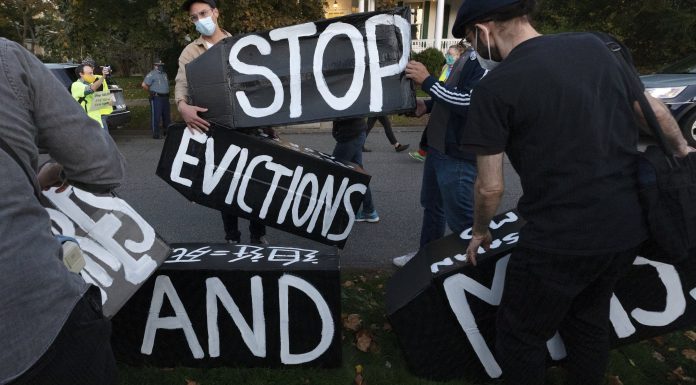(Jack Elbaum, Foundation for Economic Education) In September of 2020, the Centers for Disease Control and Prevention announced that they would implement an eviction moratorium that would last through the end of the year. It is now almost a full year since the start of this “temporary” program, and it has recently been renewed, scheduled to expire at the start of October.
After making the decision, the CDC wrote, “The eviction moratorium allows additional time for rent relief to reach renters and to further increase vaccination rates. In the context of a pandemic, eviction moratoria—like quarantine, isolation, and social distancing—can be an effective public health measure utilized to prevent the spread of communicable disease.”
Aside from the shaky (and possibly non-existent) legal basis for the eviction moratorium, it may also have the opposite of its intended effects in the long run. In fact, it could easily lead to more homelessness than there was before it was put in place due to the incentives it creates in the housing market.
According to Pew Research, “more U.S. households are headed by renters than at any point since at least 1965.” Young people and low-income families are the most likely to rent.
For these groups to be housed, there must be adequate supply. To keep up with demand, new housing must continually be put on the market — either through new units being built or existing units being transitioned into rental properties.
But goods generally — and specifically housing in this case — do not simply appear on the market out of nowhere. Individuals or businesses must conclude that it is in their financial self-interest prior to adding units to the market.
In an unhampered market, a landlord and a tenant would make an agreement as to the rent the tenant would pay in exchange for the landlord allowing them to use their private property. If the tenant does not live up to his end of the bargain — by, for example, not paying the agreed-upon rent — then the landlord can evict him. If the landlord does not live up to his end of the bargain — by, for example, failing to perform agreed-upon maintenance — then the tenant can end the lease without an obligation to pay for its remaining duration.
But the eviction moratorium is a sharp move away from this market characterized by a mutually agreed-upon contract that both sides have an obligation to uphold. Under this policy, the tenant has no obligation to live up to his end of the bargain. He can fail to pay rent — meaning he is using and occupying someone else’s private property without paying for that right — and the landlord cannot do anything about it.
As a result, the eviction moratorium sets a dangerous precedent. The policy requires that landlords pay for other people to occupy and use their privately owned land, thus precluding them from earning any money. Even though this is a supposedly “temporary” measure, the incentive to build new housing is diminished when the prospect of the government voiding a voluntary agreement between two people with no real warning becomes a reality.
One of the determinants of supply is producer expectations. If there is complete uncertainty — and producers know that government can simply take away their ability to earn money one day — that will clearly inhibit supply growth. People may opt to sell their unit rather than putting it on the rental market, for example.
Sticking it to landlords for the sake of renters is as short-sighted as the fool in the fable who killed the goose that laid the golden eggs to get at the gold inside.
This becomes doubly true when one takes into account the fact that there are over 22.5 million rental units owned by individuals — not businesses. These people are not rich or greedy. They are mostly middle class and just trying to make a little more income. Among single-property landlords, more than half of them did not even originally buy the property in order to rent it out and make money, but rather just to use it as their residence.
For some of these people, the eviction moratorium has put them in financial ruins. As a result, the future incentive for individuals to put housing units on the market has shrunk dramatically — and that, in the end, will cause one of two things to happen.
One: it may result in a housing shortage, in which case there are more people who want housing than there are units on the market. This results in homelessness.
Or, two: there is no shortage because prices rise to a level that precludes a sizable number of people from renting. This, too, results in homelessness.



